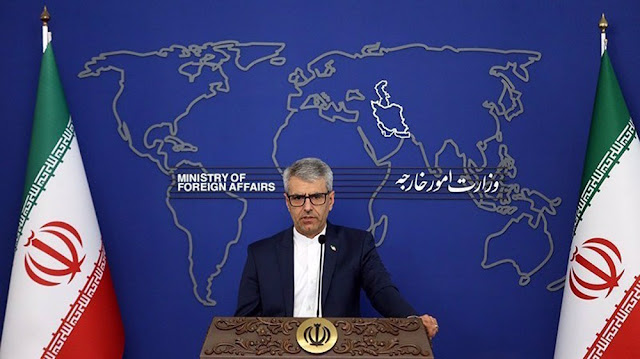Tehran, September 9, 2025 – Iran has issued a strong condemnation of recent Israeli airstrikes targeting a Hamas office in Doha, Qatar, describing the attacks as a “blatant violation of international law” and an assault on the sovereignty of the Gulf state. The Iranian Foreign Ministry, in a statement released on Tuesday, September 9, 2025, expressed solidarity with the Palestinian people and the Qatari government, urging the international community to take decisive action against what it termed “Israel’s reckless aggression.”
Spokesman for the Iranian Foreign Ministry Esmaeil Baghaei
The airstrikes, which occurred late Monday night, reportedly targeted a building in Doha used by Hamas for diplomatic and political activities. While no casualties were reported, the attack caused significant damage to the facility and heightened tensions in the region, already strained by ongoing conflicts in Gaza, the West Bank, and southern Lebanon. The Israeli military has neither confirmed nor denied its involvement, but sources close to the Israeli government claim the strike was aimed at disrupting Hamas’s international operations.
Iran’s Response: A Call for Accountability
Iran’s Foreign Ministry spokesperson, Nasser Kanaani, addressed the media in a press conference in Tehran, where he described the Israeli airstrikes as a “dangerous escalation” that undermines regional stability and violates Qatar’s territorial integrity. “The Zionist regime’s actions demonstrate its disregard for international norms and the sovereignty of other nations,” Kanaani stated. “Such acts of aggression cannot go unanswered, and the international community must hold Israel accountable for its repeated violations.”
Kanaani emphasized Iran’s unwavering support for the Palestinian cause, asserting that the attack on the Hamas office was part of a broader Israeli strategy to weaken the Palestinian resistance. “The Palestinian people have the right to resist occupation, and Hamas, as a legitimate political and resistance movement, operates within the framework of international law,” he said. “Israel’s targeting of their offices in a neutral country like Qatar is an attempt to silence their voice and suppress their struggle for freedom.”
The Iranian government also expressed solidarity with Qatar, a key regional player known for its mediation efforts in various Middle Eastern conflicts, including the Israeli-Palestinian conflict. Kanaani praised Qatar’s role as a neutral host for diplomatic engagements and condemned Israel for “undermining Doha’s efforts to foster peace and dialogue.” Iran called on the United Nations, the Arab League, and other international bodies to investigate the incident and impose sanctions on Israel for its actions.
The Context of the Airstrikes
The Israeli airstrike on the Hamas office in Doha comes amid a complex and volatile regional landscape. Qatar has long served as a hub for Hamas’s political leadership, providing a space for the group to engage in diplomatic efforts and negotiations with international actors. Doha’s role as a mediator has been particularly significant in brokering ceasefires between Israel and Hamas during periods of heightened violence in Gaza. The presence of Hamas’s political bureau in Qatar has been a point of contention for Israel, which views the group as a terrorist organization and accuses Qatar of providing a safe haven for its leaders.
The attack on the Hamas office marks a rare instance of Israel conducting military operations on the soil of a Gulf state, raising questions about the motives and timing of the strike. Analysts suggest that the operation may be linked to recent developments in the Israeli-Palestinian conflict, including intensified clashes in Gaza and the West Bank, as well as stalled negotiations over a potential ceasefire. Israel’s government, under Prime Minister Benjamin Netanyahu, has faced domestic pressure to take a hardline stance against Palestinian militant groups, particularly Hamas, which Israel holds responsible for rocket attacks and other acts of violence.
The decision to target a Hamas office in Qatar, rather than in a conflict zone like Gaza, has sparked speculation about Israel’s broader strategic objectives. Some observers argue that the strike was intended to send a message to both Hamas and Qatar, signaling that Israel is willing to take bold actions to disrupt the group’s operations, even in a neutral country. Others suggest that the attack may be an attempt to undermine Qatar’s mediation role, which has at times been viewed with suspicion by Israeli hardliners who believe Doha’s relationship with Hamas compromises its neutrality.
Qatar’s Response and Regional Implications
Qatar’s government has yet to issue an official statement regarding the airstrikes, but sources within Doha indicate that the incident has caused significant concern among Qatari officials. The Gulf state has invested heavily in its reputation as a neutral mediator, hosting peace talks and providing humanitarian aid to conflict zones across the Middle East. An attack on its soil represents a direct challenge to its sovereignty and could complicate its efforts to maintain balanced relationships with both Western and regional powers.
The airstrike also raises questions about the security of foreign diplomatic missions and political offices in Qatar. Doha has long prided itself on being a safe and stable hub for international diplomacy, hosting not only Hamas but also representatives of other groups and governments. The targeting of a Hamas office could set a precedent for further extraterritorial actions by Israel or other state actors, potentially destabilizing Qatar’s role as a regional diplomatic center.
Regionally, the attack is likely to exacerbate tensions between Israel and its adversaries, including Iran, Hezbollah, and other members of the so-called “Axis of Resistance.” Iran’s condemnation of the airstrike reflects its broader strategy of positioning itself as a defender of Palestinian rights and a counterweight to Israeli influence in the region. Tehran’s call for international action is unlikely to yield concrete results, given the polarized nature of global politics and the reluctance of major powers to confront Israel directly. However, it serves to rally support among Iran’s allies and reinforce its narrative of resistance against Western-backed Israeli aggression.
Historical Context: Israel, Hamas, and Qatar
To fully understand the significance of the airstrike, it is essential to examine the historical context of the relationships between Israel, Hamas, and Qatar. Hamas, founded in 1987 during the First Intifada, emerged as a Palestinian Islamist movement dedicated to resisting Israeli occupation. Over the decades, it has evolved from a purely militant organization into a political entity with significant influence in Gaza, where it has governed since 2007.
Qatar’s relationship with Hamas began in the early 2000s, when Doha started providing financial and political support to the group. This support has included funding for humanitarian projects in Gaza, as well as hosting Hamas’s political leadership after they were expelled from Syria in 2012 following the outbreak of the Syrian civil war. Qatar’s role has been controversial, with critics accusing it of enabling terrorism, while supporters argue that Doha’s engagement with Hamas is a pragmatic approach to fostering dialogue and reducing violence.
Israel, for its part, has consistently viewed Hamas as an existential threat, citing its charter’s call for the destruction of the Jewish state and its involvement in attacks against Israeli civilians. The Israeli government has pursued a multi-pronged strategy to counter Hamas, including military operations in Gaza, targeted assassinations of its leaders, and diplomatic efforts to isolate the group internationally. The airstrike in Qatar represents a new chapter in this strategy, signaling Israel’s willingness to extend its military reach beyond the traditional theaters of conflict.
Broader Geopolitical Ramifications
The Israeli airstrike on Qatari soil has far-reaching implications for the Middle East and beyond. At the regional level, it risks escalating tensions between Israel and the broader Arab and Muslim world. Qatar, as a member of the Gulf Cooperation Council (GCC), enjoys strong ties with other Gulf states, including Saudi Arabia and the United Arab Emirates. While some GCC countries have normalized relations with Israel under the Abraham Accords, the attack on Qatar could strain these relationships, particularly if Arab public opinion perceives it as an affront to Arab sovereignty.
The incident also has implications for the United States, which maintains a significant military presence in Qatar, including the Al Udeid Air Base, one of the largest U.S. military facilities in the Middle East. Washington has long supported Qatar’s mediation efforts while simultaneously backing Israel’s right to defend itself against Hamas. The airstrike places the U.S. in a delicate position, as it must balance its alliance with Israel against its strategic partnership with Qatar. Any perceived U.S. complicity in or indifference to the attack could undermine its credibility as a neutral actor in the region.
For Iran, the airstrike provides an opportunity to advance its narrative of resistance against Israel and its Western allies. Tehran has long sought to position itself as the leading supporter of the Palestinian cause, in contrast to what it describes as the complicity of some Arab states in normalizing ties with Israel. By condemning the attack and calling for international action, Iran aims to rally support among anti-Israel factions and deepen divisions between Israel and its Arab neighbors.
International Reactions and the Role of the United Nations
The international community’s response to the airstrike has been muted so far, with few countries issuing official statements. The United Nations, which Iran called upon to investigate the incident, faces significant challenges in addressing the issue. The U.N. Security Council, divided by the competing interests of its permanent members, is unlikely to reach a consensus on condemning Israel or imposing sanctions. The United States, as Israel’s primary ally, has historically vetoed resolutions critical of Israeli actions, a pattern that is likely to continue in this case.
Other international bodies, such as the Arab League and the Organization of Islamic Cooperation (OIC), may issue statements condemning the airstrike, but their ability to influence the situation is limited. The Arab League, in particular, has been weakened by internal divisions and differing approaches to the Israeli-Palestinian conflict, with some members prioritizing normalization with Israel over solidarity with the Palestinians.
Non-governmental organizations and human rights groups are likely to criticize the airstrike as a violation of international law, particularly given its occurrence on the territory of a sovereign state not directly involved in the Israeli-Palestinian conflict. However, such criticism is unlikely to translate into meaningful action without the support of major powers.
The Humanitarian Dimension
While the airstrike did not result in casualties, it has raised concerns about the potential humanitarian consequences of further escalation. Qatar has been a major provider of humanitarian aid to Gaza, channeling funds through Hamas to support infrastructure projects, healthcare, and education. Any disruption to Qatar’s relationship with Hamas could impact the flow of aid to Gaza, where the population already faces dire living conditions due to the Israeli blockade and repeated military offensives.
The attack also underscores the precarious situation of Palestinian political leaders operating outside Gaza. With Hamas’s offices in Qatar now targeted, other host countries may become more hesitant to provide sanctuary to Palestinian groups, potentially limiting their ability to engage in international diplomacy. This could further isolate Hamas and complicate efforts to negotiate a resolution to the Israeli-Palestinian conflict.
Looking Ahead: Potential Scenarios
The Israeli airstrike on the Hamas office in Qatar has set the stage for a range of potential outcomes, each with significant implications for the region. One possible scenario is a further escalation of tensions between Israel and Hamas, with the latter retaliating through rocket attacks or other forms of violence. Such a response could trigger another large-scale Israeli military operation in Gaza, perpetuating the cycle of violence that has characterized the conflict for decades.
Alternatively, the incident could prompt renewed diplomatic efforts to de-escalate tensions. Qatar, with its experience as a mediator, may seek to engage both Israel and Hamas to prevent further violence. However, the attack on its soil may make Doha more cautious in its dealings with Israel, potentially complicating its role as a neutral broker.
For Iran, the airstrike provides an opportunity to deepen its influence in the region by rallying support for the Palestinian cause. Tehran may increase its financial and military support for Hamas and other Palestinian groups, further complicating the regional security landscape. At the same time, Iran’s ability to effect change is constrained by its own economic challenges and international sanctions, limiting its capacity to project power beyond rhetorical support.
Conclusion
Iran’s condemnation of the Israeli airstrikes on the Hamas office in Qatar reflects the broader geopolitical fault lines that define the Middle East today. The attack, while limited in its immediate impact, carries significant symbolic weight, challenging Qatar’s sovereignty and raising questions about the future of its mediation role. For Iran, the incident is an opportunity to reaffirm its commitment to the Palestinian cause and position itself as a counterweight to Israeli aggression.
As the international community grapples with the implications of the airstrike, the need for a comprehensive and inclusive approach to resolving the Israeli-Palestinian conflict becomes ever more apparent. Without addressing the root causes of the conflict—occupation, displacement, and systemic inequality—such incidents are likely to recur, further destabilizing an already volatile region. The path forward requires bold leadership, diplomatic innovation, and a commitment to justice and peace from all parties involved.






